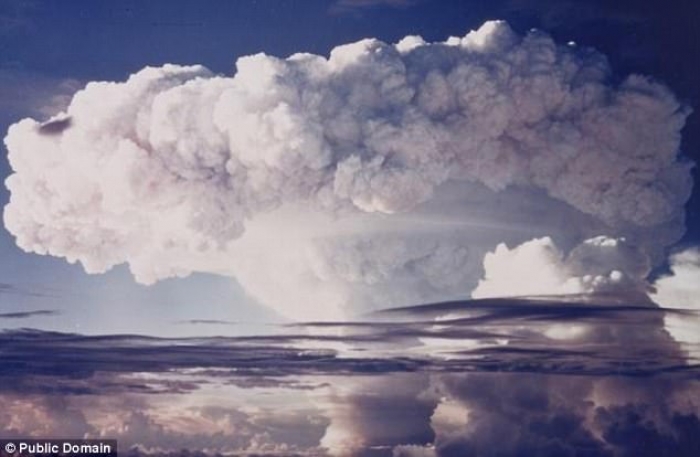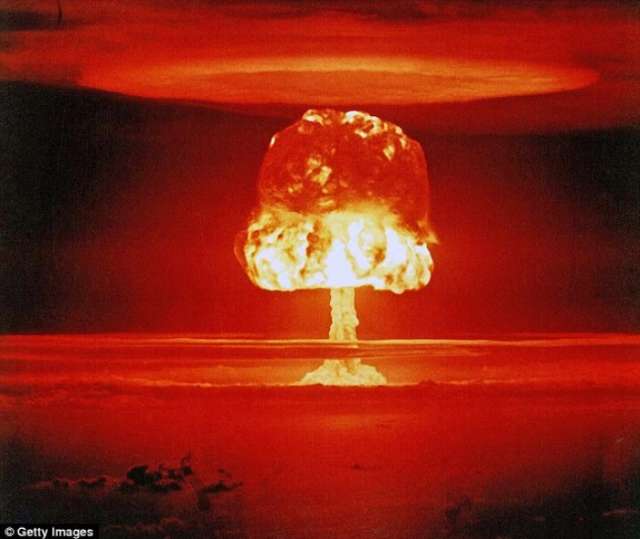A new report found that warheads of magnitudes already owned by several major nuclear powers could trigger climate change as the resulting black ash causes temperatures to drop, leading to drought, famine, and billions of deaths.
The researchers from the University of Nebraska-Lincoln investigated 19 types of weapons currently held by five major nuclear powers: the US, Russia, China, the United Kingdom, and France.
According to the report, it would take just a handful of these bombs to bring on disastrous effects that would ripple worldwide.
‘We’re losing our memory of the Cold War and we’re losing our memory of how important it is to get this right,’ said co-author Tyler White, a political scientist who specializes in international security and nuclear policy.
‘Even a conflict that doesn’t involve the United States can impact us and people around the world.’
With just three 1.2-megaton (MT) bombs, or two Trident D5 SLBM (each with four 475-KT warheads), the US could bring on a nuclear-drought, the researchers warn.
Only four 800-KT Russian ICBMs or ten 300-KT French gravity bombs would be needed to cause similar climatic effects.
And, China could bring on the phenomenon with just one 5-MT land-based missile, which would burn an area ‘similar in size to that of one hundred 15-KT explosions.’
‘Thus, use of as few as 1 to 10 deployed nuclear weapons, and fewer than 25 of these prevalent types, from the five official nuclear weapons countries could produce a nuclear drought,’ the researchers warned in the new report.
While the effects wouldn’t be as dramatic as those predicted in a ‘nuclear winter’ scenario, the resulting drought – also known as nuclear autumn – could have significant impacts around the world, the researcher say.
‘The question is not if a nuclear drought can occur, but what factors increase its probability of occurring and what actions can be taken to mitigate the potentially devastating global impacts,’ said Adam Liska, a biological systems engineer at Nebraska.
Previous research determined that a blast capable of igniting an area of about 1,300 square kilometers (500 square miles), would pump over 5 million tons of ash into the stratosphere.
And, this would block out sunlight, causing temperature and rainfall to drop.
‘If the ash reaches the stratosphere, many months could pass before it dissipates,’ said Robert Oglesby, a professor of Earth and atmospheric sciences.
The researchers say these high quantities of black carbon in the stratosphere would cause agricultural growing seasons to be reduced by 10-40 days each year for at least five years.
Below average temperatures would persist for far longer, potentially remaining low for up to 25 years.
And, immediately after the blast, temperatures could drop to levels colder than they’ve been in the last 1,000 years.

The researchers note that the risk of mutual consequences kept the US and the Soviet Union in check during the Cold War. With the new analysis, they say countries can make more informed decisions in light of recent threats from North Korea. An image from a 1952 test is pictured
The nuclear drought would cause a significant decrease in precipitation in the Asian monsoon region, by as much as 20-80 percent, and reductions in rainfall across South America and southern Africa, the American Southwest, and Western Australia could cause the regions to be 20-60 percent drier than usual.
‘Climatic changes due to nuclear explosions on developed land could essentially produce a global “nuclear drought,” and the resulting famines could kill up to a billion people from starvation, which would probably most affect those communities that are already in food-insecure environments in the developing world, particularly in sub-Saharan Africa, South Asia, and the Middle East,’ the researchers wrote.
‘Significant changes in precipitation would probably also increase conflict in developing regions, although global temperature reductions may reduce social violence in the United States and Other developed countries.’
The researchers note that the risk of widespread consequences kept the US and the Soviet Union in check during the Cold War.
At the time, each nation recognized that a nuclear attack from either side would cause ultimately mutual destruction.
With the new analysis, the researchers say countries can make more informed decisions in light of recent threats from North Korea.
‘We pulled together what is known about nuclear weapons today, to make a case about the magnitude of these impacts,’ Liska said.
‘With that understanding, we can make better choices going forward.’
More about: #nuclear
















































